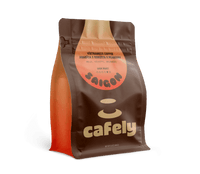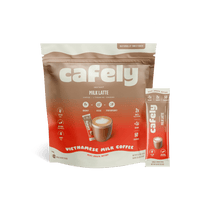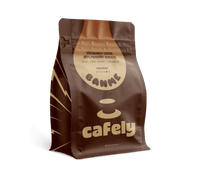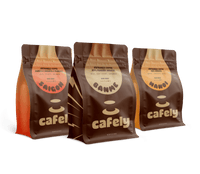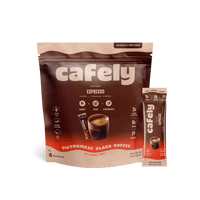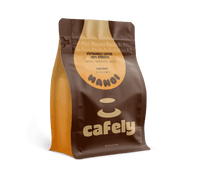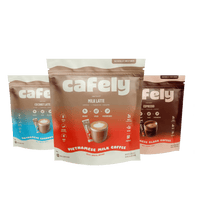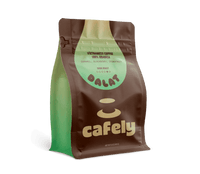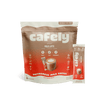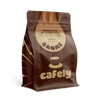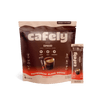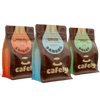Around 90% of American adults don’t eat enough fruits or vegetables, yet three out of four take at least one dietary supplement [1].
It’s clear we’re trying to bridge the gap. But when stress piles on, we need more than a generic multivitamin.
We need targeted support backed by real evidence to help our brains and bodies bounce back. That’s exactly what we’re unpacking in this guide.
Science-Backed Supplements That May Help Reduce Stress
None of these are magic pills. But used smartly, the right nutrients and herbs can support your stress response, boost mental resilience, and help you feel more grounded, naturally.
1. Adaptogens: Balance Your Stress Response Over Time
Adaptogens are herbs that help your body adapt to physical and mental stress [2]. Instead of pushing your system up or down, they work behind the scenes to regulate and stabilize.
Here are a few adaptogens commonly used for stress:
Ashwagandha
Ashwagandha is one of the most studied adaptogens. It’s been shown to lower cortisol levels, improve sleep, and reduce self-reported stress and anxiety [3].
In several clinical trials, participants taking ashwagandha reported less daily stress and better sleep after just a few weeks.
- Best Form: KSM-66 or Sensoril extracts
- Typical Dose: 300 to 600 mg/day
- Works Well For: Chronic stress, fatigue, poor sleep
Rhodiola Rosea

Rhodiola is ideal when your stress feels acute or mentally draining. It supports focus, stamina, and motivation during periods of intense workload or emotional pressure [4]. Because it can be slightly stimulating, it's best taken earlier in the day.
- Best Form: Standardized extracts (3% rosavins, 1% salidroside)
- Typical Dose: 200 to 400 mg/day
- Works Well For: Burnout, mental fatigue, focus under stress
Schisandra
Schisandra is a lesser-known adaptogen used in Traditional Chinese Medicine to improve physical endurance and emotional balance [5].
Regular use may reduce mental fog, improve concentration, and regulate mood, particularly in cases of long-term stress. It’s most effective when taken daily and combines well with ashwagandha or Rhodiola.
- Best Form: Schisandra chinensis extract (standardized to lignans)
- Typical Dose: 500 to 1,000 mg/day
- Works Well For: Low energy, chronic stress, emotional regulation
2. Amino Acids That Support Mood & Focus
Certain amino acids play a direct role in how your brain manages stress. They’re involved in the production of neurotransmitters like GABA, serotonin, and dopamine, all essential for calm, focus, and mood stability.
L-Theanine
L-theanine, found naturally in green tea, promotes calm focus by boosting GABA and alpha brain waves [6].
It typically takes effect within 30 to 60 minutes and is best used in doses of 100 to 200 mg. It’s safe to combine with caffeine or adaptogens to smooth out stimulation without causing drowsiness.
- Best Form: Pure L-theanine or green tea extract
- Typical Dose: 100 to 200 mg/day
- Works Well For: Calm focus, stress relief, caffeine balancing
GABA (Gamma-Aminobutyric Acid)
GABA is your brain’s primary calming neurotransmitter, though its absorption varies depending on the form [7].
Pharma-GABA (made through natural fermentation) may offer better effects. Some users feel relaxed within 30 minutes, especially when GABA is stacked with magnesium or L-theanine.
- Best Form: Pharma-GABA (fermentation-derived)
- Typical Dose: 100 to 300 mg/day
- Works Well For: Tension, irritability, fast-acting stress support
L-Tryptophan / 5-HTP
These amino acids help your body produce serotonin, supporting emotional balance and stress regulation [8].
5-HTP works faster, while L-tryptophan is slower and better tolerated for sensitive individuals. Use low doses initially, and avoid mixing with SSRIs without medical supervision.
- Best Form: 5-HTP (Griffonia seed) or L-tryptophan
- Typical Dose: 100 to 300 mg/day
- Works Well For: Low mood, anxiety, emotional eating
3. Herbal Calming Agents: Gentle, Natural Stress Relief
These herbal supplements for stress have been used for centuries to promote calmness, ease nervousness, and support mental clarity, often with fewer side effects than prescription drugs.
Lemon Balm
Lemon balm is a calming herb known for its gentle anti-anxiety and sedative effects, often used to ease restlessness, tension, or irritability [9].
It works well in the evening or during high-stress periods and can be paired with L-theanine or magnesium for enhanced relaxation.
- Best Form: Tea or capsule (standardized extract)
- Typical Dose: 300 to 600 mg/day or 1 to 2 cups of tea
- Works Well For: Mild anxiety, tension, sleep support
Passionflower
Passionflower is a traditional calming herb that may ease acute stress, especially before sleep or high-stress events like presentations [10].
It has mild sedative properties and is often used as needed rather than daily.
- Best Form: Tincture, tea, or capsule
- Typical Dose: 250 to 500 mg/day or as needed
- Works Well For: Situational anxiety, restlessness, sleep onset
Chamomile
Chamomile is best known for its calming, sleep-promoting qualities, but it also soothes mild anxiety and stress-related digestive issues [11].
It is widely tolerated and gentle enough for daily use in tea or extract form.
- Best Form: Organic tea or liquid extract
- Typical Dose: 1 to 2 cups of tea or 400 to 800 mg/day extract
- Works Well For: Sleep onset, mild anxiety, stress digestion
4. Micronutrients That Support Stress Resilience
Sometimes it’s not about exotic herbs, it’s about giving your nervous system the basic tools it needs to stay balanced.
These vitamins and minerals are foundational for stress relief.
Magnesium
Magnesium is one of the most research-backed minerals for stress. It helps regulate the nervous system, reduce muscle tension, and support sleep quality, especially under pressure [12].
- Best Forms: Glycinate (calming), threonate (brain-boosting)
- Typical Dose: 200 to 400 mg/day
- Works Well For: Muscle tension, sleep quality, stress overload
Vitamin B-Complex
A high-quality B-complex supports neurotransmitter production, mood regulation, and energy metabolism, all critical under chronic stress [13].
Methylated forms are best for people with genetic variants like MTHFR that affect B vitamin usage.
- Best Form: Full-spectrum methylated B-complex
- Typical Dose: As directed on label (usually 1 capsule/day)
- Works Well For: Burnout, low energy, cognitive fatigue
Omega-3 Fatty Acids

Omega-3s (especially EPA and DHA) are anti-inflammatory and support brain health under stress [14].
Low levels have been linked to increased anxiety, mood swings, and even depression.
- Best Form: Molecularly distilled fish oil (with EPA/DHA)
- Typical Dose: 1,000 to 2,000 mg combined EPA/DHA per day
- Works Well For: Mood swings, anxiety, brain stress recovery
Lifestyle Strategies for Reducing Stress
While supplements for stress can offer support, your daily habits carry just as much weight. Consistent lifestyle choices may shape how resilient you feel long before a capsule kicks in.
These strategies are grounded in science and proven to complement stress relief supplements, helping you manage tension from the inside out.
1. Exercise More
Physical activity is one of the most reliable, science-backed methods for managing stress [15].
When you exercise, your body releases endorphins, chemicals that naturally improve mood and reduce pain perception. It also lowers cortisol, the stress hormone that fuels anxious feelings and mental fog.
You do not need to train like an athlete. A brisk 20 to 30-minute walk, a yoga session, or a quick home workout can be enough to shift your mindset and physiology.
Tips to exercise more:
- Aim for at least 150 minutes of moderate activity per week.
- Consistency matters more than intensity.
- Choose activities you actually enjoy to stay motivated.
2. Practice Good Sleep Hygiene
Stress and poor sleep feed off each other; if one gets worse, the other usually follows.
When you’re sleep-deprived, your body becomes more reactive to stress, your decision-making suffers, and your emotional regulation drops. Cortisol levels stay elevated longer, which keeps your nervous system on high alert. Practicing solid sleep hygiene is essential for staying calm and clear-headed [16].
Here’s how to practice good sleep:
- Stick to a consistent bedtime and wake-up time.
- Avoid screens at least one hour before sleep.
- Keep your room cool, dark, and quiet.
Combined with vitamins for stress and a balanced evening routine, sleep hygiene sets the stage for overnight recovery, mentally and hormonally.
3. Take Time for Mindfulness, Breathwork, & Meditation
Slowing down your breath is one of the fastest ways to calm your nervous system [17].
Mindfulness practices, like focused breathing, guided meditation, or simply sitting in stillness, can shift your body from “fight-or-flight” mode into the parasympathetic state, often called “rest and digest.” This helps lower blood pressure, regulate cortisol, and reduce anxious spirals.
Stress relief supplements often support these same systems, but pairing them with breathwork adds a powerful layer of control.
Here are a few tips for calming your mind:
- Try the 4-7-8 breathing method — inhale for 4, hold for 7, exhale for 8.
- Start with just 5–10 minutes of stillness each day.
- Use free apps like Insight Timer or Calm if you’re new to meditation.
4. Make Social Connections
Humans are wired to feel safer when they’re connected to others.
Loneliness and social isolation are major contributors to perceived stress, according to multiple studies [18]. Socializing, even in short bursts, can trigger the release of oxytocin, a hormone that lowers stress response and promotes bonding.
Simply put, being around people you trust helps you feel more secure, supported, and emotionally balanced.
Here’s how to make healthy social connections:
- Schedule regular catch-ups with friends or family.
- Join a club, community, or fitness group that aligns with your interests.
- If you’re feeling isolated, even small interactions (like chatting with a barista) can help.
Supplements for stress are valuable, but the community is a free and irreplaceable medicine.
5. Limit Stimulants
Too much caffeine or alcohol can spike your stress levels, even if you don’t notice it right away.
Caffeine increases your heart rate and activates your sympathetic nervous system (the “stress response” mode). Alcohol, while initially relaxing, can disrupt sleep quality and trigger a rebound effect that increases anxiety.
Reducing these stimulants helps your nervous system stay more stable, especially if you’re working on improving your baseline calm with natural stress relief supplements.
Here’s how to limit stimulants:
- Limit coffee to 1–2 cups per day, ideally before noon.
- Avoid energy drinks or excessive sugar-caffeine combos.
- Consider herbal alternatives like rooibos, lemon balm, or chamomile.
6. Eat a Quality Diet

The link between diet and stress is real; it’s deeply rooted in how food affects inflammation, brain chemistry, and gut health [19].
Ultra-processed foods high in refined sugars and trans fats can fuel systemic inflammation, which has been associated with worsened mood, fatigue, and heightened stress response.
A well-rounded diet full of whole foods supports stable energy, better sleep, and improved mental clarity. Plus, many nutrients tied to mood regulation, like magnesium, B vitamins, and omega-3s, come directly from your plate.
Here’s how to keep up with a quality diet:
- Prioritize leafy greens, colorful vegetables, and lean proteins.
- Add omega-3-rich foods like salmon, flaxseeds, or walnuts.
- Limit processed snacks, sugary drinks, and excessive salt.
A good meal won’t fix everything, but it lays the groundwork for every supplement or strategy you try.
And what you eat with your coffee in the morning also matters; a sugary pastry spikes your blood sugar, while a protein-rich option helps you stay balanced and focused.
Common Causes of Chronic Stress
Stress becomes chronic when your body stays stuck in “fight-or-flight” mode, and never fully returns to baseline.
Here are some of the most common culprits behind that stuck state:
1. Work-Related Burnout
Long hours, unclear expectations, job insecurity, and lack of recovery time can lead to occupational burnout, a specific type of stress recognized by the World Health Organization. Over time, burnout leads to emotional exhaustion, detachment, and a sharp drop in motivation.
- Feeling constantly behind despite working hard is a key sign.
- Lack of support or appreciation from leadership can worsen symptoms.
- Even remote or freelance workers aren’t immune; blurred boundaries add up.
Stress relief supplements can offer short-term support, but without systemic change or rest, burnout often worsens.
2. Financial Insecurity
Worrying about how to pay bills, manage debt, or save for the future creates a constant low-grade tension, one that spikes during unexpected expenses or economic downturns.
- This type of stress is tied closely to the nervous system’s threat response.
- It’s linked to sleep disruptions, anxiety, and decision fatigue.
- Even thinking about money has been shown in studies to elevate cortisol levels [20].
While natural stress relief supplements like magnesium or L-theanine may take the edge off, long-term relief usually requires financial planning, support, or structural change.
3. Chronic Illness or Pain
Living with chronic conditions like autoimmune disease, arthritis, fibromyalgia, or migraines is physically draining, and that burden spills over into your emotional life.
- Pain increases cortisol and disrupts sleep.
- Fatigue can limit your ability to socialize, move, or relax.
- Managing symptoms becomes a full-time mental load.
Vitamins for stress and calming supplements may help support resilience, but ongoing medical care and self-compassion are equally important.
4. Poor Diet & Lack of Sleep
Skipping meals, living on ultra-processed snacks, and going to bed late don’t just make you feel off; they amplify your body’s stress response [21].
- Inadequate nutrition can deplete key nutrients needed for mood balance (like B-complex vitamins, magnesium, or omega-3s).
- Irregular sleep increases cortisol, impairs memory, and reduces coping ability.
- This cycle makes everything feel harder, including managing minor daily stress.
Eating nutrient-dense foods and pairing them with the best supplements for stress builds a better foundation for your nervous system.
5. Trauma, Life Transitions, or Caregiving Stress
Past trauma, major life changes (like divorce or job loss), or long-term caregiving can deeply affect your nervous system, even if you’re managing day-to-day responsibilities [22].
- Emotional suppression or “powering through” doesn’t erase the physiological impact.
- Hypervigilance, fatigue, and anxiety often show up even years later.
- The stress can become “invisible,” but still deeply dysregulating.
In these situations, natural stress relief supplements may be supportive, but therapy or trauma-informed care can be essential to healing.
When to See a Doctor or Mental Health Professional
Even the best supplements for stress have limits. Some symptoms signal that your body or mind may need more targeted care.
Do not ignore the following signs:
1. Panic Attacks or Chronic Insomnia
If your heart races, your chest tightens, or you feel like you’re losing control, even at rest, this could be a panic attack. These often require clinical support to manage effectively.
Signs to look out for:
- Trouble falling or staying asleep for weeks at a time also deserves professional attention.
- Sleep medications are not always the answer; underlying anxiety or hormonal imbalances could be driving the pattern.
2. Intrusive Thoughts or Overwhelming Anxiety
Everyone experiences worry, but if you’re having persistent, distressing thoughts you can’t shut off, or feel like you’re constantly “on edge”, it’s time to reach out.
Signs to look out for:
- Obsessive thought loops, fear of impending doom, or difficulty functioning are red flags.
- Supplements may help take the edge off, but won’t address underlying psychological patterns.
3. Physical Symptoms Without a Clear Cause
Chronic stress doesn’t just live in the mind. It can show up in your body in subtle but serious ways.
Signs to look out for:
- GI symptoms like nausea, bloating, diarrhea, or IBS-like discomfort.
- Muscle tension, headaches, or even unexplained chest pain.
- Frequent illnesses or longer recovery times due to lowered immunity.
Always rule out medical causes first, especially for chest pain or major GI changes.
4. Supplements Aren’t Making a Dent
If you’ve been consistent with stress relief supplements, improved your habits, and still feel like your stress is spiraling, talk to a professional. Something deeper may be at play.
Signs to look out for:
- Depression, anxiety disorders, PTSD, and hormonal imbalances (like thyroid or adrenal dysfunction) can mimic everyday stress.
- Blood tests, therapy, or lifestyle interventions might uncover hidden issues.
Complications from Untreated Chronic Stress

Stress might start in the mind, but if it sticks around long enough, it reshapes the entire body.
What feels like occasional tension can turn into a cascade of physical and emotional problems, many of which are harder to reverse the longer they go unchecked [23].
Here’s what can happen if chronic stress becomes your baseline.
1. Cardiovascular Issues
Prolonged stress puts your heart under constant pressure. Elevated cortisol and adrenaline levels can raise blood pressure, speed up your heart rate, and increase your risk for arrhythmias.
Over time, stress hormones can damage artery walls and contribute to plaque buildup, setting the stage for heart disease. Even if you feel emotionally calm, your cardiovascular system might still be paying the price for unresolved tension.
2. Mental Health Conditions
When your nervous system is always on high alert, your brain chemistry begins to shift. Untreated stress is a major contributor to depression and anxiety disorders, especially when it’s paired with sleep deprivation or isolation.
Over time, symptoms like irritability, mood swings, brain fog, and emotional numbness may become the new normal. These changes are not just temporary; they often require professional support to resolve fully.
3. Hormonal Imbalances
Your stress response is closely tied to your endocrine system. Chronic stress can throw off cortisol rhythms, making it harder to wake up, fall asleep, or regulate energy throughout the day. This hormonal disruption also affects reproductive health, weight balance, and insulin sensitivity.
One common symptom is feeling “wired but tired,” mentally overstimulated yet physically drained, which is a sign your hormones are out of sync.
4. Digestive Issues
There’s a direct line between your brain and your gut, and chronic stress tends to mess with both ends. It can slow down digestion, trigger bloating or cramps, and contribute to conditions like IBS and acid reflux.
Stress also alters your gut microbiome and weakens the gut lining, making it harder for your body to absorb nutrients properly. If you’ve noticed more digestive discomfort during high-stress periods, it’s likely not a coincidence.
5. Immune Suppression & Inflammation
Stress doesn’t just wear you down emotionally; it also weakens your defenses. Over time, elevated stress hormones suppress immune function, making you more prone to colds, infections, or slower recovery.
At the same time, stress can drive low-grade inflammation, which plays a role in many chronic diseases, from autoimmune flare-ups to metabolic conditions. What starts as a mental burden can gradually chip away at your physical resilience.
10 FAQs About Stress & Supplements
Want to learn more about stress and supplements?
Here are the answers to 10 common questions about stress and supplements:
1. Do Stress Supplements Work Immediately?
Some, like L-theanine, can promote calm within 30–60 minutes. Others, such as ashwagandha or magnesium, may take days or weeks of consistent use to build noticeable effects. Timing depends on the supplement, your stress levels, and how your body responds.
2. Can I Combine Multiple Stress Supplements?
Yes, many can be stacked safely, like magnesium with adaptogens or L-theanine with Rhodiola. However, combining too many at once can cause side effects or diminish effectiveness. Check for overlapping mechanisms and always read labels carefully.
3. Is It Safe To Take Supplements With Antidepressants?
It depends. Some supplements, like 5-HTP or St. John’s Wort, may interact dangerously with SSRIs or SNRIs. Even natural products can impact your brain chemistry. Always check with your doctor or pharmacist before combining supplements with prescription meds.
4. What’s the Best Supplement for Stress at Work?
L-theanine and Rhodiola rosea are a solid duo for workplace stress. They support mental clarity, reduce fatigue, and help with focus, without making you drowsy. Ideal for staying sharp in high-pressure environments.
5. Do Adaptogens Help With Adrenal Fatigue?
Adaptogens may support stress hormone balance, which can help with fatigue and low energy. But "adrenal fatigue" isn’t a medically recognized diagnosis. These herbs may assist with symptoms, but they’re not a cure for burnout or chronic exhaustion.
5. Does GABA Help With Stress?
GABA has calming effects for some people, but its ability to cross the blood–brain barrier is debated. Some may benefit from precursors like L-theanine or PharmaGABA, which are believed to enhance GABA activity more reliably.
7. Can Supplements Replace Therapy or Medication?
No. Supplements can support stress relief, but they’re not a substitute for therapy, lifestyle changes, or prescribed medications. They work best as part of a bigger plan, not the whole solution.
8. Are Natural Supplements Safer Than Medications?
Not necessarily. "Natural" doesn’t mean harmless; many herbs interact with medications or cause side effects. Always research ingredients, stick to recommended doses, and consult a healthcare provider if you have underlying health conditions.
9. How Long Should I Take Stress Supplements?
It varies. Some are safe for daily use, others work best in cycles (like Rhodiola). If a supplement stops being effective or causes new symptoms, take a break and reassess. Always follow the guidance on duration and dosing.
10. Can I Build a Tolerance to Natural Stress Remedies?
Yes, it’s possible, especially with adaptogens like Rhodiola or calming herbs like Passionflower. Cycling them (e.g., 3 weeks on, 1 week off) can help maintain effectiveness and prevent your body from adapting to the effects.
References
- Maryland Action Guide on Fruits and Vegetables. (n.d.).
- Panossian, A., & Wikman, G. (2010). Effects of Adaptogens on the Central Nervous System and the Molecular Mechanisms Associated with Their Stress—Protective Activity. Pharmaceuticals, 3(1), 188–224.
- National Institutes of Health. (2023, October 24). Office of Dietary Supplements - Ashwagandha: Is It Helpful for stress, anxiety, or sleep? Ods.od.nih.gov.
- Ivanova Stojcheva, E., & Quintela, J. C. (2022). The Effectiveness of Rhodiola rosea L. Preparations in Alleviating Various Aspects of Life-Stress Symptoms and Stress-Induced Conditions—Encouraging Clinical Evidence. Molecules, 27(12), 3902.
- Nowak, A., Zakłos-Szyda, M., Błasiak, J., Nowak, A., Zhang, Z., & Zhang, B. (2019). Potential of Schisandra chinensis (Turcz.) Baill. in Human Health and Nutrition: A Review of Current Knowledge and Therapeutic Perspectives. Nutrients, 11(2), 333.
- Hidese, S., Ogawa, S., Ota, M., Ishida, I., Yasukawa, Z., Ozeki, M., & Kunugi, H. (2019). Effects of L-Theanine Administration on Stress-Related Symptoms and Cognitive Functions in Healthy Adults: A Randomized Controlled Trial. Nutrients, 11(10), 2362.
- Hepsomali, P., Groeger, J. A., Nishihira, J., & Scholey, A. (2020). Effects of Oral Gamma-Aminobutyric Acid (GABA) Administration on Stress and Sleep in Humans: A Systematic Review. Frontiers in Neuroscience, 14(923).
- Imeri, L., Mancia, M., Bianchi, S., & Opp, M. R. (2000). 5-Hydroxytryptophan, but not L-tryptophan, alters sleep and brain temperature in rats. Neuroscience, 95(2), 445–452.
- Mathews, I. M., Eastwood, J., Lamport, D. J., Le Cozannet, R., Fanca-Berthon, P., & Williams, C. M. (2024). Clinical Efficacy and Tolerability of Lemon Balm (Melissa officinalis L.) in Psychological Well-Being: A Review. Nutrients, 16(20), 3545–3545.
- Janda, K., Wojtkowska, K., Jakubczyk, K., Antoniewicz, J., & Skonieczna-Żydecka, K. (2020). Passiflora incarnata in Neuropsychiatric Disorders—A Systematic Review. Nutrients, 12(12), 3894.
- Gupta, S. (2010). Chamomile: A herbal medicine of the past with a bright future. Molecular Medicine Reports, 3(6).
- Cuciureanu, M. D., & Vink, R. (2011). Magnesium and stress. Nih.gov; University of Adelaide Press.
- Kennedy, D. (2016). B Vitamins and the Brain: Mechanisms, Dose and Efficacy—A Review. Nutrients, 8(2), 68.
- Swanson, D., Block, R., & Mousa, S. A. (2012). Omega-3 fatty acids EPA and DHA: Health benefits throughout life. Advances in Nutrition, 3(1), 1–7.
- Childs, E., & de Wit, H. (2014). Regular exercise is associated with emotional resilience to acute stress in healthy adults. Frontiers in Physiology, 5(161).
- Alanazi, E. M., Alanazi, A. M. M., Albuhairy, A. H., & Alanazi, A. A. A. (2023). Sleep hygiene practices and its impact on mental health and functional performance among adults in tabuk city: A cross-sectional study. Cureus, 15(3), 1–12.
- Srour, R. A., & Keyes, D. (2024). Lifestyle Mindfulness In Clinical Practice. PubMed; StatPearls Publishing.
- Shankar, R. (2023). Loneliness, Social Isolation, and Its Effects on Physical and Mental Health. Missouri Medicine, 120(2), 106–108.
- Basso, M., Zorzan, I., Johnstone, N., Barberis, M., & Kathrin Cohen Kadosh. (2024). Diet quality and anxiety: a critical overview with focus on the gut microbiome. Frontiers in Nutrition, 11.
- Kandasamy, N., Hardy, B., Page, L., Schaffner, M., Graggaber, J., Powlson, A. S., Fletcher, P. C., Gurnell, M., & Coates, J. (2014). Cortisol shifts financial risk preferences. Proceedings of the National Academy of Sciences, 111(9), 3608–3613.
- Lopes Cortes, M., Andrade Louzado, J., Galvão Oliveira, M., Moraes Bezerra, V., Mistro, S., Souto Medeiros, D., Arruda Soares, D., Oliveira Silva, K., Nicolaevna Kochergin, C., Honorato dos Santos de Carvalho, V. C., Wildes Amorim, W., & Serrate Mengue, S. (2021). Unhealthy Food and Psychological Stress: The Association between Ultra-Processed Food Consumption and Perceived Stress in Working-Class Young Adults. International Journal of Environmental Research and Public Health, 18(8), 3863.
- Bremner, J. D. (2006). Traumatic stress: effects on the brain. Dialogues in Clinical Neuroscience, 8(4), 445–461.
